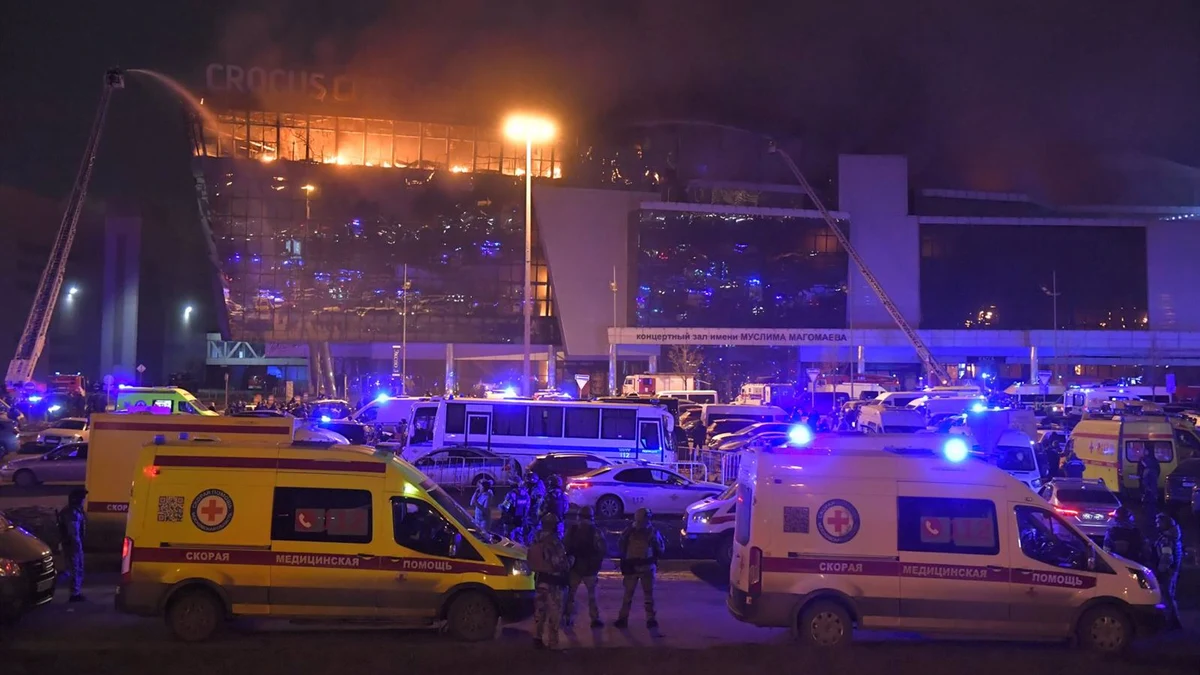
The attack carried out by the terrorist group Islamic State (IS) this Friday in Moscow occurs after a series of threats and represents a retaliation by the jihadist organization against the Russian participation in the conflicts in Syria and the African Sahel. A threat that Western embassies in Russia saw coming, since weeks before they had warned of possible attacks in the area. However, President Vladimir Putin ignored these warnings, stating that they were “an attempt to intimidate and destabilize” Russian society.
On March 8, various Western embassies, including the United States and the United Kingdom, They warned their nationals in Russia about the possibility of imminent attacks in the country, especially at big events in Moscow. “The embassy is aware of information that suggests that Extremists plan attacks on mass gatherings in Moscow, including concerts,” said a statement from the US embassy.
On March 19, just three days before the attack, Putin called for alert “obvious blackmail” carried out with “the intention of intimidating and destabilizing our society.” This was reported by the Russian agency TASS.
The notices
Earlier, on March 7, the Federal Security Service of Russia (FSB) announced that it had neutralized an IS cell in Kaluga province who intended to attack a synagogue in Moscow. “The terrorists showed armed resistance during their arrest and were neutralized by defensive fire,” the TASS agency noted.
On March 3, Russian security forces They eliminated six alleged jihadists in an operation in Ingushetia, in the North Caucasus. The National Anti-Terrorist Committee has reported that the deceased were members of ISIS. Incident in Kabul The IS branch in Russia, known as ‘Wilayat al Quqaz’ (Caucasus Province), was founded by extremist Rustam Asildarov in 2015 but allegedly ceased its activity after his assassination by the Russian Government in Dagestan in December 2016 This Friday’s attack in Moscow is preceded by another action against Russian interests.
On September 5, 2023, IS claimed a attack near the Russian embassy in Kabul, where the second secretary and a security guard perished. And Russia, along with a few nations such as Pakistan and Iran, maintained its embassy in Kabul after the return to power on August 15, 2021 of the Taliban, who, despite their fundamentalism, are rivals of IS.
The Syrian conflict and tensions in the Sahel
“Islamic State fighters attacked a large group of Christians in the city of Krasnogorsk, on the outskirts of the Russian capital, Moscow, and killed and injured hundreds of people and caused extensive destruction there before safely retreating to their bases,” the group said on its Telegram channel.
The attack is the first serious terrorist attack that has occurred in this country since the start of the war in Ukraine more than two years ago and the largest perpetrated in the Russian capital in more than a decade. But why is Daesh attacking Russia? The key is the tensions in the Sahel and the Syrian conflict.
In September 2015, at the request of President Bashar al-Assad, Russia began supporting the Syrian government against opposition rebels and jihadist groups, including IS. Russian intervention was key to quelling the rebellion and defeating IS, which had annexed territories in Syria to its ‘caliphate’ in Iraq. Jihadists from Russian republics in the Caucasus joined IS in Syria to fight their own country’s forces and some returned to Russia after the conflict, posing a threat to Moscow.
Besides, Instability in the Sahel has led to pro-Russian coups in Niger, Mali and Burkina Fasowith the participation of Wagner mercenaries in the anti-terrorist fight in those countries, where there is a large presence of the Islamic State and also groups loyal to Al Qaeda.
Some regions of Mali, for example, have become a battleground between IS and government forces, supported by Wagner, sometimes causing massacres in the ranks of civilians. In this country, the Islamic State carries out constant assassinations and is currently in control of Menaka, a region located in the east, next to the border with Niger.
After taking over the province and besieging its capital, IS is now focusing there on patrolling its villages and organizing religious rallies to impose its ideology, in an area where some claim that wants to found his next ‘caliphate’.
Source: Lasexta
Ricardo is a renowned author and journalist, known for his exceptional writing on top-news stories. He currently works as a writer at the 247 News Agency, where he is known for his ability to deliver breaking news and insightful analysis on the most pressing issues of the day.











